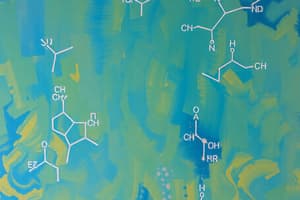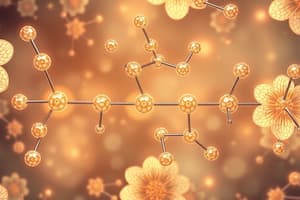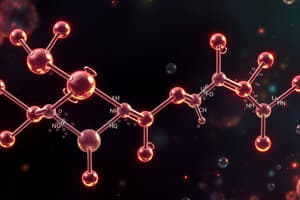Podcast
Questions and Answers
Understanding functional groups is essential for deducing the properties of drugs.
Understanding functional groups is essential for deducing the properties of drugs.
True (A)
What are curly arrows used to denote in chemical reactions?
What are curly arrows used to denote in chemical reactions?
Bond making and breaking processes
In functional group chemistry, a substance that donates electrons is known as a _____ and one that accepts electrons is known as a _____ .
In functional group chemistry, a substance that donates electrons is known as a _____ and one that accepts electrons is known as a _____ .
nucleophile; electrophile
Match the following terms with their definitions:
Match the following terms with their definitions:
What characterizes an electrophile?
What characterizes an electrophile?
A nucleophile is characterized by having a positive charge.
A nucleophile is characterized by having a positive charge.
What is a leaving group?
What is a leaving group?
Electrophiles are typically __________ charged particles.
Electrophiles are typically __________ charged particles.
Which of the following is NOT a characteristic of a good leaving group?
Which of the following is NOT a characteristic of a good leaving group?
A reaction involving a nucleophile and an electrophile generally results in the formation of a __________.
A reaction involving a nucleophile and an electrophile generally results in the formation of a __________.
What does a single-headed arrow represent in radical mechanisms?
What does a single-headed arrow represent in radical mechanisms?
Double bonds in alkenes can act as strong electrophiles.
Double bonds in alkenes can act as strong electrophiles.
The activation energy is defined as the energy difference between the starting material and the final products.
The activation energy is defined as the energy difference between the starting material and the final products.
What is formed when two radicals each donate one electron?
What is formed when two radicals each donate one electron?
The energy difference between reactants and products is known as the ________ change.
The energy difference between reactants and products is known as the ________ change.
In a radical mechanism, what is required to break a bond?
In a radical mechanism, what is required to break a bond?
Radicals always have a negative charge.
Radicals always have a negative charge.
What signifies an empty p orbital in the context of a polarised bond?
What signifies an empty p orbital in the context of a polarised bond?
Which of the following statements about resonance structures is true?
Which of the following statements about resonance structures is true?
Resonance forms can have different numbers of paired and unpaired electrons.
Resonance forms can have different numbers of paired and unpaired electrons.
What type of electrons are moved in resonance structures?
What type of electrons are moved in resonance structures?
The _______ represents the extreme possibilities of electron location in resonance structures.
The _______ represents the extreme possibilities of electron location in resonance structures.
Which of the following is NOT a characteristic of resonance structures?
Which of the following is NOT a characteristic of resonance structures?
Only sp3 hybridized atoms can participate in resonance.
Only sp3 hybridized atoms can participate in resonance.
What do resonance structures help to understand in chemistry?
What do resonance structures help to understand in chemistry?
What is produced during the condensation process of ester formation?
What is produced during the condensation process of ester formation?
Oxidation is the opposite of reduction.
Oxidation is the opposite of reduction.
What role does NAD+ play in the biological oxidation of alcohols?
What role does NAD+ play in the biological oxidation of alcohols?
The process of converting an alcohol to an aldehyde is facilitated by the enzyme _____ .
The process of converting an alcohol to an aldehyde is facilitated by the enzyme _____ .
Match the following components of ester formation with their descriptions:
Match the following components of ester formation with their descriptions:
Which has the capability of converting a hydroxyl group to a halogen?
Which has the capability of converting a hydroxyl group to a halogen?
Disulfiram can inhibit the conversion of aldehyde to acid.
Disulfiram can inhibit the conversion of aldehyde to acid.
What type of reaction is involved in the formation of an alkyl halide?
What type of reaction is involved in the formation of an alkyl halide?
The first step in biological oxidation converts alcohol to an ____________ .
The first step in biological oxidation converts alcohol to an ____________ .
What is a consequence of the condensation process in ester formation when water is produced?
What is a consequence of the condensation process in ester formation when water is produced?
What is the primary functional group in alcohols?
What is the primary functional group in alcohols?
Phenols are less acidic than cyclohexanol.
Phenols are less acidic than cyclohexanol.
What effect do halogens have on the acidity of alcohols?
What effect do halogens have on the acidity of alcohols?
The pKa of phenol is approximately _____ compared to alcohols like cyclohexanol.
The pKa of phenol is approximately _____ compared to alcohols like cyclohexanol.
Match the alcohol to its boiling point trend:
Match the alcohol to its boiling point trend:
Which of the following factors decreases the acidity of alcohols?
Which of the following factors decreases the acidity of alcohols?
Alcohols can participate in nucleophilic substitution reactions.
Alcohols can participate in nucleophilic substitution reactions.
Describe how solubility of small alcohols in water changes as the size of the alkyl group increases.
Describe how solubility of small alcohols in water changes as the size of the alkyl group increases.
The reaction of alkenes with water to form alcohols is known as __________.
The reaction of alkenes with water to form alcohols is known as __________.
Match the alcohol with its preparation method:
Match the alcohol with its preparation method:
Which alcohol has the highest pKa value?
Which alcohol has the highest pKa value?
The boiling points of alcohols are generally low due to weak intermolecular forces.
The boiling points of alcohols are generally low due to weak intermolecular forces.
What is the common pKa range for alcohols?
What is the common pKa range for alcohols?
Alcohols are classified as __________ compounds based on their structure.
Alcohols are classified as __________ compounds based on their structure.
Match the description with the correct type of alcohol:
Match the description with the correct type of alcohol:
What characteristic do molecules with the same functional group generally possess?
What characteristic do molecules with the same functional group generally possess?
In drug design, which aspect is primarily affected by the physiochemical properties of a substance?
In drug design, which aspect is primarily affected by the physiochemical properties of a substance?
Which of the following statements best defines a functional group in organic molecules?
Which of the following statements best defines a functional group in organic molecules?
How do hydrocarbon parts of drugs typically contribute to their properties?
How do hydrocarbon parts of drugs typically contribute to their properties?
What is the significance of receptor binding in pharmacology?
What is the significance of receptor binding in pharmacology?
What shape do sp3 hybridized carbon atoms adopt?
What shape do sp3 hybridized carbon atoms adopt?
Which bond representation indicates a bond pointing towards the observer?
Which bond representation indicates a bond pointing towards the observer?
What type of reaction mechanism involves the movement of one electron at a time?
What type of reaction mechanism involves the movement of one electron at a time?
In reactivity and reaction mechanisms, what primarily describes the formation of products from reactants?
In reactivity and reaction mechanisms, what primarily describes the formation of products from reactants?
What characterizes a nucleophile?
What characterizes a nucleophile?
How is a chiral center defined in terms of carbon atoms?
How is a chiral center defined in terms of carbon atoms?
Which representation indicates that a bond is in the plane of the screen?
Which representation indicates that a bond is in the plane of the screen?
What distinguishes radical mechanisms from other chemical mechanisms?
What distinguishes radical mechanisms from other chemical mechanisms?
What type of addition occurs when alkenes react with halogens such as Cl2 or Br2?
What type of addition occurs when alkenes react with halogens such as Cl2 or Br2?
Which ion is formed when a bromine molecule interacts with an alkene during the cyclic bromonium ion formation?
Which ion is formed when a bromine molecule interacts with an alkene during the cyclic bromonium ion formation?
What stabilizes the product in a radical reaction involving bromine?
What stabilizes the product in a radical reaction involving bromine?
What is the role of a catalyst in the hydrogenation of alkenes?
What is the role of a catalyst in the hydrogenation of alkenes?
During the halogenation of alkenes, what is the stereospecificity of the reaction?
During the halogenation of alkenes, what is the stereospecificity of the reaction?
In what way does the reactivity of an alkene change after hydrogenation?
In what way does the reactivity of an alkene change after hydrogenation?
What is the main product formed from the addition of bromine to an alkene?
What is the main product formed from the addition of bromine to an alkene?
What characteristic defines the addition of halogens to alkenes as stereospecific?
What characteristic defines the addition of halogens to alkenes as stereospecific?
Which condition is essential for the hydrogenation of an alkene to occur?
Which condition is essential for the hydrogenation of an alkene to occur?
What factor primarily determines the distribution patterns of products in free-radical substitution reactions?
What factor primarily determines the distribution patterns of products in free-radical substitution reactions?
Which type of carbon radical is the most stable?
Which type of carbon radical is the most stable?
How does hyperconjugation stabilize carbocations?
How does hyperconjugation stabilize carbocations?
Which of the following radicals is unusually stable due to resonance effects?
Which of the following radicals is unusually stable due to resonance effects?
In terms of the stability of radicals, which arrangement produces the most stable intermediate?
In terms of the stability of radicals, which arrangement produces the most stable intermediate?
What role do alkyl groups play in the stability of radicals?
What role do alkyl groups play in the stability of radicals?
Which of the following represents the least stable type of carbon radical?
Which of the following represents the least stable type of carbon radical?
Which molecular feature is crucial for increasing the stability of a radical?
Which molecular feature is crucial for increasing the stability of a radical?
What stabilizes benzyl and allyl radicals specifically?
What stabilizes benzyl and allyl radicals specifically?
Which of the following statements is true regarding radical stability?
Which of the following statements is true regarding radical stability?
What is the general formula for alkynes?
What is the general formula for alkynes?
Which factor determines the reactivity of alkynes?
Which factor determines the reactivity of alkynes?
Which reaction type is commonly used during the alkylation of terminal alkynes?
Which reaction type is commonly used during the alkylation of terminal alkynes?
Which of the following statements about alkyne acidity is true?
Which of the following statements about alkyne acidity is true?
In comparison to alkenes, how do alkynes behave in terms of reactivity?
In comparison to alkenes, how do alkynes behave in terms of reactivity?
What is a characteristic of internal alkenes or alkynes in terms of boiling point?
What is a characteristic of internal alkenes or alkynes in terms of boiling point?
Which addition reaction can alkynes undergo in excess reagent conditions?
Which addition reaction can alkynes undergo in excess reagent conditions?
Which of the following pKa values represents a terminal alkyne?
Which of the following pKa values represents a terminal alkyne?
Which addition rule is followed by the reactions of alkynes?
Which addition rule is followed by the reactions of alkynes?
Which statement correctly describes the stability of alkenes?
Which statement correctly describes the stability of alkenes?
What type of bond is primarily responsible for the reactivity of alkenes?
What type of bond is primarily responsible for the reactivity of alkenes?
Which statement accurately reflects the boiling points of alkenes compared to alkanes?
Which statement accurately reflects the boiling points of alkenes compared to alkanes?
Which characteristic is true about cis and trans isomers of alkenes?
Which characteristic is true about cis and trans isomers of alkenes?
Which of the following processes is NOT commonly associated with alkene reactivity?
Which of the following processes is NOT commonly associated with alkene reactivity?
What does Markovnikov's rule predict in electrophilic addition reactions?
What does Markovnikov's rule predict in electrophilic addition reactions?
What type of interactions do alkenes exhibit due to their slightly polar nature?
What type of interactions do alkenes exhibit due to their slightly polar nature?
Which of the following statements is true regarding the solubility of alkenes?
Which of the following statements is true regarding the solubility of alkenes?
What is the effect of alkyl groups on the stability of alkenes?
What is the effect of alkyl groups on the stability of alkenes?
Flashcards
What is electronegativity?
What is electronegativity?
The ability of a molecule to attract electrons due to its electronegativity.
What is a functional group?
What is a functional group?
A functional group is a specific group of atoms within a molecule that gives the molecule its characteristic chemical properties.
What is an electrophile?
What is an electrophile?
A molecule that is attracted to electron-rich areas and accepts electrons.
What is a nucleophile?
What is a nucleophile?
Signup and view all the flashcards
What is a leaving group?
What is a leaving group?
Signup and view all the flashcards
What are the characteristics of an electrophile?
What are the characteristics of an electrophile?
Signup and view all the flashcards
What is polarization by proximity?
What is polarization by proximity?
Signup and view all the flashcards
Why is polarization by proximity important?
Why is polarization by proximity important?
Signup and view all the flashcards
What makes a good leaving group?
What makes a good leaving group?
Signup and view all the flashcards
What is a carbocation?
What is a carbocation?
Signup and view all the flashcards
Single-Headed Arrow
Single-Headed Arrow
Signup and view all the flashcards
Radical
Radical
Signup and view all the flashcards
Transition State
Transition State
Signup and view all the flashcards
Intermediate
Intermediate
Signup and view all the flashcards
Standard Free Energy Change
Standard Free Energy Change
Signup and view all the flashcards
Activation Energy
Activation Energy
Signup and view all the flashcards
Why Study Reaction Mechanisms?
Why Study Reaction Mechanisms?
Signup and view all the flashcards
Polar Bond
Polar Bond
Signup and view all the flashcards
Resonance Structures
Resonance Structures
Signup and view all the flashcards
Resonance Forms vs. Isomers
Resonance Forms vs. Isomers
Signup and view all the flashcards
Resonance Arrows
Resonance Arrows
Signup and view all the flashcards
Resonance and Stability
Resonance and Stability
Signup and view all the flashcards
Electrons Involved in Resonance
Electrons Involved in Resonance
Signup and view all the flashcards
Resonance and Reactions
Resonance and Reactions
Signup and view all the flashcards
sp3 Hybridized Atoms and Resonance
sp3 Hybridized Atoms and Resonance
Signup and view all the flashcards
Resonance Structures and Reality
Resonance Structures and Reality
Signup and view all the flashcards
Fischer Esterification
Fischer Esterification
Signup and view all the flashcards
Condensation Reaction
Condensation Reaction
Signup and view all the flashcards
Le Chatelier's Principle
Le Chatelier's Principle
Signup and view all the flashcards
Reduction
Reduction
Signup and view all the flashcards
Oxidation
Oxidation
Signup and view all the flashcards
Conversion to Haloalkanes
Conversion to Haloalkanes
Signup and view all the flashcards
Alcohol Dehydrogenase
Alcohol Dehydrogenase
Signup and view all the flashcards
Aldehyde Dehydrogenase
Aldehyde Dehydrogenase
Signup and view all the flashcards
Disulfiram (Antabuse)
Disulfiram (Antabuse)
Signup and view all the flashcards
Addition of H-X
Addition of H-X
Signup and view all the flashcards
Alcohols
Alcohols
Signup and view all the flashcards
pKa
pKa
Signup and view all the flashcards
Inductive effect
Inductive effect
Signup and view all the flashcards
Alkyl group
Alkyl group
Signup and view all the flashcards
Halogen group
Halogen group
Signup and view all the flashcards
Phenol
Phenol
Signup and view all the flashcards
Hydrolysis of alkyl halides
Hydrolysis of alkyl halides
Signup and view all the flashcards
Hydration of alkenes
Hydration of alkenes
Signup and view all the flashcards
Reduction of carbonyl compounds
Reduction of carbonyl compounds
Signup and view all the flashcards
Solubility
Solubility
Signup and view all the flashcards
Hydrogen bonding
Hydrogen bonding
Signup and view all the flashcards
Electronegativity
Electronegativity
Signup and view all the flashcards
Nucleophile
Nucleophile
Signup and view all the flashcards
Substitution reaction
Substitution reaction
Signup and view all the flashcards
Reactivity
Reactivity
Signup and view all the flashcards
Electrophile
Electrophile
Signup and view all the flashcards
ADME
ADME
Signup and view all the flashcards
Functional Group
Functional Group
Signup and view all the flashcards
Chemical Similarity
Chemical Similarity
Signup and view all the flashcards
Drug Structure
Drug Structure
Signup and view all the flashcards
Functional Group Importance
Functional Group Importance
Signup and view all the flashcards
3D Representations: Tetrahedral Shape of sp3 Hybridised Carbon Atoms
3D Representations: Tetrahedral Shape of sp3 Hybridised Carbon Atoms
Signup and view all the flashcards
What is a Chiral Centre?
What is a Chiral Centre?
Signup and view all the flashcards
What is a Reaction Mechanism?
What is a Reaction Mechanism?
Signup and view all the flashcards
What are Ionic or Polar Reactions?
What are Ionic or Polar Reactions?
Signup and view all the flashcards
Define a Nucleophile.
Define a Nucleophile.
Signup and view all the flashcards
What are Radical Reactions?
What are Radical Reactions?
Signup and view all the flashcards
Radical Stability and Product Distribution
Radical Stability and Product Distribution
Signup and view all the flashcards
Radical Stability Order
Radical Stability Order
Signup and view all the flashcards
Alkyl Groups and Radical Stability
Alkyl Groups and Radical Stability
Signup and view all the flashcards
Hyperconjugation
Hyperconjugation
Signup and view all the flashcards
Special Radicals: Benzyl & Allyl
Special Radicals: Benzyl & Allyl
Signup and view all the flashcards
Carbocations and Stability
Carbocations and Stability
Signup and view all the flashcards
Stability and Reaction Probability
Stability and Reaction Probability
Signup and view all the flashcards
Free Radical Substitution
Free Radical Substitution
Signup and view all the flashcards
Side Reactions in Free Radical Chemistry
Side Reactions in Free Radical Chemistry
Signup and view all the flashcards
Substituted Product Distribution
Substituted Product Distribution
Signup and view all the flashcards
What are alkenes?
What are alkenes?
Signup and view all the flashcards
Why are alkenes weakly polar?
Why are alkenes weakly polar?
Signup and view all the flashcards
What is cis-trans isomerism in alkenes?
What is cis-trans isomerism in alkenes?
Signup and view all the flashcards
What is hyperconjugation?
What is hyperconjugation?
Signup and view all the flashcards
What are alkynes?
What are alkynes?
Signup and view all the flashcards
What is electrophilic addition?
What is electrophilic addition?
Signup and view all the flashcards
What is Markovnikov's rule?
What is Markovnikov's rule?
Signup and view all the flashcards
How does carbocation stability affect electrophilic addition?
How does carbocation stability affect electrophilic addition?
Signup and view all the flashcards
What is hydrohalogenation?
What is hydrohalogenation?
Signup and view all the flashcards
What is hydration?
What is hydration?
Signup and view all the flashcards
Halogen Addition to Alkenes
Halogen Addition to Alkenes
Signup and view all the flashcards
Syn Addition
Syn Addition
Signup and view all the flashcards
Anti Addition
Anti Addition
Signup and view all the flashcards
Bromonium Ion
Bromonium Ion
Signup and view all the flashcards
Hydrogenation of Alkenes
Hydrogenation of Alkenes
Signup and view all the flashcards
Markovnikov's Rule
Markovnikov's Rule
Signup and view all the flashcards
Alkynes
Alkynes
Signup and view all the flashcards
Electrophilic Addition
Electrophilic Addition
Signup and view all the flashcards
What is an alkyne?
What is an alkyne?
Signup and view all the flashcards
Distinguish between terminal and internal alkynes.
Distinguish between terminal and internal alkynes.
Signup and view all the flashcards
What is the general formula of alkynes?
What is the general formula of alkynes?
Signup and view all the flashcards
Why are terminal alkynes more acidic than internal alkynes?
Why are terminal alkynes more acidic than internal alkynes?
Signup and view all the flashcards
Describe the reactivity of alkynes.
Describe the reactivity of alkynes.
Signup and view all the flashcards
What is the alkylation of terminal alkynes?
What is the alkylation of terminal alkynes?
Signup and view all the flashcards
Compare the reactivity of alkynes to alkenes.
Compare the reactivity of alkynes to alkenes.
Signup and view all the flashcards
How does Markovnikov's rule apply to the addition of HX to alkynes?
How does Markovnikov's rule apply to the addition of HX to alkynes?
Signup and view all the flashcards
Why are alkynes insoluble in water?
Why are alkynes insoluble in water?
Signup and view all the flashcards
Why do alkynes act as nucleophiles?
Why do alkynes act as nucleophiles?
Signup and view all the flashcards
Study Notes
MPharm Programme PHA111 Functional Group Chemistry
- This is a week 10 and week 11 course on functional group chemistry.
- The lecturer is Dr. Stephanie Myers, Senior Lecturer in Medicinal Chemistry.
- The course is for the MPharm Programme.
- The course covers functional group chemistry, learning objectives, functional groups, chemical similarity, definitions of functional groups, chemical representations, reactivity and reaction mechanisms, nucleophiles, electrophiles, leaving groups, bond cleavage, curly arrows, polar and radical mechanisms, transition states and intermediates, reasons to study mechanisms, mechanisms of penicillins, hydrocarbon compounds, alkanes, physical properties of alkanes, reactivity of alkanes, halogenation of alkanes, radical stability, hyperconjugation, radical stability, resonance contributors and hybrids, resonance structures, resonance, resonance stability of radicals, oxidation of drugs, auto oxidation.
- The course also covers functional group chemistry 2 and 3.
- Additional topics include learning objectives, unsaturated compounds, alkenes, alkenes as isomers, alkenes in vision, alkenes reactivity, preparation, elimination, addition reactions, alkynes, alkynes structure, alkynes physical properties, alkynes reactivity, alkylation of terminal alkynes, alkynes addition of HX, alkynes properties, addition reactions, Markovnikov's rule, carbocation stability, hydration of alkenes, anti-Markovnikov addition, addition of halogens, hydrogenation of alkenes, hydrogenation of alkynes, versatile reagents, acid/base properties of amino acids, alcohols, preparation of alcohols, reduction of carbonyl compounds, reactivity of alcohols, ester formation (Fischer esterification), oxidation of alcohols, biological oxidation of alcohols, haloalkanes, haloalkanes as anaesthetics, haloalkanes physical properties, haloalkanes reactivity, SN1 and SN2 reactions, amines, amine occurrence, amine synthesis, reactions with carboxylic acid derivatives, amines structure and bonding, amine classification, amines hydrogen bonding, lone pairs of amines, and acid/base properties of amino acids (Zwitterions).
Studying That Suits You
Use AI to generate personalized quizzes and flashcards to suit your learning preferences.
Related Documents
Description
Prepare to test your understanding of key concepts and principles that are essential for a successful career in pharmacy.





